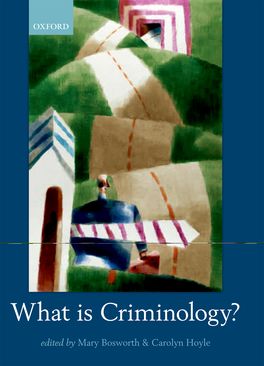What is Criminology?

What is Criminology?
|
ISBN: |
9780199571826 |
|
Binding: |
Hardback |
|
Published: |
20 Feb 2011 |
|
Availability: |
|
|
Series: |
$227.00 AUD
$259.99 NZD
Description
Contents
Mary Bosworth and Carolyn Hoyle: Introduction
PART I Criminology and its Constituencies
1. Conceptual allegiances: whose side are you on?
1: Ian Loader and Richard Sparks: Criminology's Public Roles: A Drama in Six Acts
2: Michael R. Gottfredson: Some Advantages of a Crime-Free Criminology
3: Eugene McLaughlin: Critical Criminology: The Renewal of Theory Politics and Practice
4: Jeff Ferrell: Disciplinarity and Drift
5: David Brown: The Global Financial Crisis: Neo-Liberalism, Social Democracy and Criminology
6: Pat Carlen: Against Evangelism in Academic Criminology: For Criminology as a Scientific Art
2. Methodological allegiances: how should criminology be done?
7: Kathleen Daly: Shake it up Baby: Practicing Rock 'n' Roll Criminology
8: Clifford Shearing and Monique Marks: Criminology's Disney World: The Ethnographer's Ride of South African Criminal Justice
9: Nicole Rafter: Origins of Criminology
10: Linda G. Mills: He was a Woman: Pitfalls and Possibilities of Popular Audiences
11: Marcus Felson: Sort Crimes, Not Criminals
12: Paternoster and Shawn Bushway: Studying Desistance from Crime: Where Quantitative Meets Qualitative Methods
13: Mike Hough: Criminology and the Role of Experimental Research
3. Political allegiances: what is criminology for?
14: Beth E. Richie: Criminology and Social Justice: Expanding the Intellectual Commitment
15: Thomas Mathiesen and Ole Kristian Hjemdal: A New Look at Victim and Offender - An Abolitionist Approach
16: Natalie J. Sokoloff and Amanda Burgess-Proctor: Remembering Criminology's 'Forgotten Theme': Seeking Justice in U.S. Crime Policy Using an Intersectional Approach
17: Chris Cunneen: Postcolonial Perspectives for Criminology
PART II Criminology and its Borders
1. The limits of the discipline: where do we draw the line?
18: Lucia Zedner: Putting Crime Back on the Criminological Agenda
19: Aaron Doyle, Janet Chan, and Kevin D. Haggerty: Transcending the Boundaries of Criminology: The Example of Richard Ericson
20: David Garland: Criminology's Place in the Academic Field
21: Shadd Maruna and Charles Barber: Why Can't Criminology Be More Like Medical Research?: Be Careful What You Wish For
22: Andrew Ashworth: Criminal Justice, Not Criminology?
23: William A. Schabas: Criminology, Accountability and International Justice
2. The limits of geography: does criminology travel?
24: Ben Bowling: Transnational Criminology and the Globalization of Harm Production
25: Stephan Parmentier: The Missing Link: Criminological Perspectives on Dealing with the Past
26: David Nelken: Why Compare Criminal Justice?
27: Katja Franko Aas: Visions of Global Control: Cosmopolitan Aspirations in a World of Friction
3. The limits of the academy: what is the impact of criminology?
28: Lawrence W. Sherman: Criminology as Invention
29: Kelly Hannah-Moffat: Criminological Cliques: Narrowing Dialogues, Institutional Protectionism, and the Next Generation
30: Tim Hope: Official Criminology and the New Crime Sciences
31: Alfred Blumstein: Criminology: Science and Policy Analysis
32: Ian O'Donnell: Criminology, Bureaucracy and Unfinished Business
33: Tim Newburn: Criminology and Government: Some reflections on Recent Developments in England
34: Alison Liebling: Being a Criminologist: Investigation as a Lifestyle and Living
Mary Bosworth and Carolyn Hoyle: Conclusion
Authors
Edited by Mary Bosworth , Reader in Criminology, University of Oxford
Carolyn Hoyle , Reader in Criminology, University of Oxford
Mary Bosworth joined the Oxford Centre for Criminology in 2006. Her major research interests are in punishment, incarceration and immigration detention with a particular focus on how matters of race, gender and citizenship shape the experience and nature of confinement. Carolyn Hoyle has been at the Oxford Centre for Criminology since 1991. She has published empirical and theoretical research on a number of criminological topics including policing, domestic violence, restorative justice and the death penalty.
Reviews
`This is...long overdue volume, which ultimately aims to encourage reflexivity both within criminology and beyond. This aim is initiated immediately; the introductory chapter reflects upon the various problems the authors encountered in enlisting scholars to contribute to the volume, beginning with a discussion as to reasons why certain academics refused their invitation...the essays in this book collectively represent a series of enticing and nuanced debates about what criminology is perceived to be, and what it potentially can become' Claudine Young, The Cambrian Law Review 2010